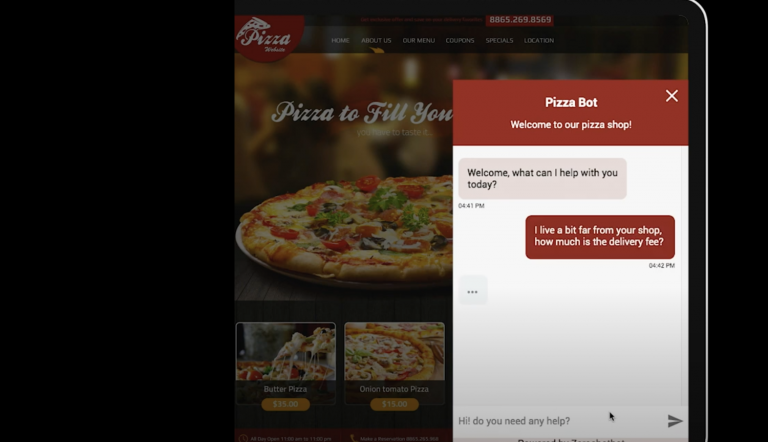A pair of award-winning computer scientists and professors have developed a chatbot that even the most ardent critic of non-human interaction can learn to love. Anyone who grew up during the 2000s and had access to AIM Messenger is sure to remember a particularly groundbreaking innovation that emerged during the time. Named ‘SmarterChild,’ this chatbot was able to answer very, very simple questions, remember your name… and not much else.
Since this early iteration, chatbots have emerged across the board, mainly in online retail settings or in customer service interfaces, and have evolved to answer customer queries around operating hours, return policies, customer support, products and more.
Although these chatbots are significantly more advanced now than in SmarterChild’s heyday, there are a number of factors that make implementing chatbots a challenge for many businesses. The number one factor is the prohibitive cost, which runs into the tens of thousands per month. Closely following cost is time, with many chatbots taking months to not only build, but to train — which, when paying tens of thousands per month, is not an expense or task many businesses can afford to take on while they wait for the bot to start providing some return on investment.
These two factors are the exact pain-points ZeroShotBot is solving through their disruptive conversational AI technology. Developed by award-winning computer scientists and University of Michigan Professors, Dr. Jason Mars and Dr. Lingjia Tang, the technology aims to break down accessibility barriers and democratize chat bots for businesses big and small — but how exactly do they plan to achieve this?
“We’ve studied and worked in the AI industry for some time, and recognized there had to be a better way to create and implement chatbots that doesn’t require a lot of time, nor a lot of capital for set-up and overhead costs,” says Dr. Jason Mars, Founder and CEO of ZeroShotBot.
“Essentially, we realized the promise of chatbots didn’t align with the status quo, so we set about rethinking the concept from the ground-up, with a focus on accessibility. We wanted to make this technology available to the small businesses who act as the engine of our economy — to democratize chatbots. To do this, we needed to focus on bringing costs down, as well as reducing the time it takes to train the AI,” adds Mars.
This is exactly what Dr. Mars and Dr. Tang did, developing ZeroShotBot, an AI-Powered chatbot that harnesses the power of zero-shot learning — a process by which a machine learning model is capable of performing tasks they haven’t had exposure to before. This innovation greatly reduces the time it takes to train the AI — from 12-18 months down to nothing — and means businesses don’t have to contract experts or invest time in sourcing and providing the AI with training data for it to be able to do its job. In fact, through ZeroShotBot’s technology any business, big or small, can create and deploy a high-functioning and personalized bot within hours, and without specialized training.
Because the task of training the bot is eliminated, so are the high costs. Compared to the thousands spent per month on traditional retail chatbots, ZeroShotBot starts at $40 per month. This low price point means businesses of any size can afford to implement this technology and enjoy the myriad of benefits, including being able to offer 24/7 customer service and increased productivity among customer service agents, and more, which are gained through the implementation of this technology.
Although the challenges of providing a high level of customer service are significant, there are ways to introduce efficiencies that not only serve customers, but business leaders as well. By implementing technologies like ZeroShotBot, business leaders can rest easy knowing that the bulk of their customer service is handled automatically, while also reaping the benefits of freed up resources, time, capital and staff that come as a result.
Related Articles

Beyond the AI Hype: Why Retailers Are Doubling Down on Real-time Inventory
AI assistants can now take shoppers from search to checkout and breeze right past a merchant’s website. The traditional product discovery and purchasing journey are now happening inside AI channels, and major platforms are all aligning on this new shopping protocol.

How to Manage Your Amazon Seller Account Effectively in 2026?
Learn key strategies for managing your Amazon seller account in 2026, including listing optimization, account health management, inventory control, and advertising.

Transaction-Level Data Is Raising the Bar for Attribution and Accountability
For retailers building or scaling retail media and broader commerce marketing programs, this shift reshapes how audiences should be built and forces a more disciplined approach to transparency and cross-channel accountability.

How Rising Consent Awareness Is Reshaping Customer Experience, Data Quality, and Campaign Performance
It also revealed that another 35% expect to deploy personalized AI recommendations in the next year, as AI moves from pilots into the heart of omnichannel journeys, search and merchandising.


 for the latest news and job opportunities in retail tech
for the latest news and job opportunities in retail tech 